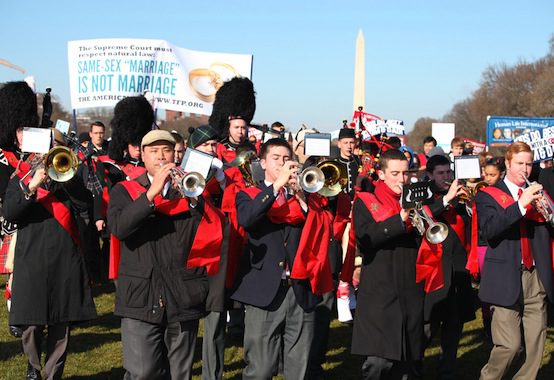The Lessons of Social Conservatism’s Setbacks

No matter what the Supreme Court decides to do about the Defense of Marriage Act or California’s Proposition 8, it seems a foregone conclusion that gay marriage will one day prevail nationally.
Millions will celebrate—and social conservatives should reflect. For the coming defeat on marriage lays bare the flaws in their political strategies.
First, conservative Christians disregarded Psalms and put their trust in princes. White evangelicals, the largest single bloc of “values voters,” cast one out of every three votes George W. Bush received in 2004.
It wasn’t wrong to get involved in politics and try to reshape the Republican Party per se. But too many of them believed against all available evidence that the nation’s salvation lay in GOP presidents, legislators, and judges. That faith turned out to be misplaced.
Other social conservatives sold their souls for a mess of pottage, climbing the greasy pole of the Republican Party without holding its leaders accountable. Too much political capital was spent on dead-on-arrival constitutional amendments and promises to retake the Supreme Court.
If the Court strikes down the Defense of Marriage Act, social conservatives may regret not simply dusting off Article III, Section II of the U.S. Constitution. Jurisdiction stripping actually could be achieved with a Republican president and Congress.
A Republican-controlled House actually passed the Marriage Protection Act with the blessing of the Bush administration. It might have kept the Supremes from hearing the DOMA case entirely. But social conservatives instead focused on the ill-fated federal marriage amendment.
Nancy Pelosi recently sneered that this legislation concedes the unconstitutionality of DOMA. On the contrary, it simply says that if state marriage laws aren’t under federal jurisdiction then this applies to the federal courts too. The insight isn’t limited to marriage; it is relevant to social issues ranging from abortion to school prayer.
Too often politically active social conservatives failed to make the positive case for traditional marriage as an institution that arose specifically to meet needs that derive from heterosexual sex. Instead they relied on moral objections to, as well as personal distaste for, homosexuality, already in decline back when only 27 percent of the American people favored redefining marriage.
Emphasizing the reasons American law and custom traditionally defined marriage as a union of a man and a woman might have helped salvage as much of the marriage culture as possible even if same-sex marriage supporters still ultimately won the debate. It also might have awakened the country to the growing divergence between the private and public purposes of marriage. Instead many social conservatives hoped to re-stigmatize homosexuality.
Social conservatives avoided compromises, like decoupling some incidents of marriage from the institution itself and extending them to individuals regardless of relationship status. While this wouldn’t have satisfied those whose main goal was “marriage equality” in culture and law, it might have met the need for tangible benefits like hospital visitation without the “separate but equal” approach of civil unions or domestic partnerships—which social conservatives opposed in any event.
The end result is that millions of Americans, especially the young, now believe, as New York Times columnist Ross Douthat put it, that “the procreative understanding of [marriage] was founded entirely on prejudice, and that the shift away from a male-female marital ideal is analogous to the end of segregation.”
That view, if taken to its logical conclusion, has the potential to be far more destructive to marriage and the family than anything gays and lesbians could possibly do.
It also has obvious implications for the religious liberties of millions of Catholics, Southern Baptists, nondenominational evangelicals, Mormons, and even United Methodists whose churches still affirm traditional moral teachings concerning homosexuality and marriage.
Most gay marriage laws currently contain religious freedom clauses protecting churches and, in some cases, individual believers. But if such views really are morally equivalent to racism in the minds of our political class, one must expect the law eventually to treat them equivalently.
Some form of détente in the culture wars might once have been possible, recognizing that neither gays nor conservative Christians are going away anytime soon (or are entirely mutually exclusive), when the fight was more evenly matched. But a defeated group of traditionalists who evinced little concern for prerogatives of their opponents won’t be in much of a position to make bargains.
Which brings us to what might be the biggest political miscalculation of the Christian right: entering politics to make sinners virtuous rather than to defend their own freedom of conscience.
W. James Antle III is editor of the Daily Caller News Foundation and author of the forthcoming book Devouring Freedom: Can Big Government Ever Be Stopped?
Comments